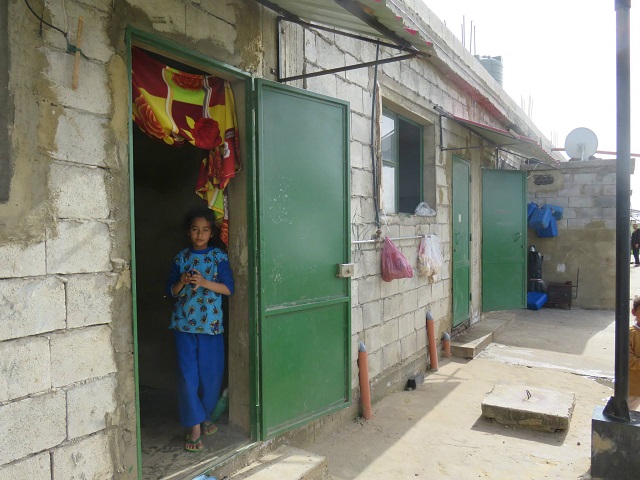
At an April EU conference in Brussels called “Supporting the Future of Syria and the Region,” the government of Lebanon made an impassioned pitch for billions of euros of additional humanitarian aid to help it deal with the massive influx of refugees — now totaling about 1.5 million, or a quarter of its population.
The large influx has definitely added social and economic pressures to an already fragile, dysfunctional country, and many Lebanese believe they themselves need aid and thus resent any additional burden. Thus, authorities have built a case to donors requesting funding to invest even more in water, electricity, schools, roads and other public services, focusing on compensating host communities for damages inflicted by the growing number of refugees. To date, Lebanon has received more than €1 billion from the European Commission alone; in 2017, €85 million has been allocated for humanitarian assistance to the country.
However, the fact is that the impact has not been all negative. Al-Jazeera recently documented that refugees also have provided a large pool of cheap (and unfortunately, unprotected) labor for the Lebanese economy. Most Syrians work in sectors that the Lebanese tend to avoid, earning an average of $250 a month, much lower than the national minimum of $450. Meanwhile, much of the aid targets entire communities (since Lebanon has opted against setting up camps for Syrians), thus benefiting local Lebanese as well. For instance, for Save the Children, most of its beneficiaries in Tripoli are Lebanese. The international charity also offers landlords free property renovation if they rent to refugees for one year.
At the same time, locals are profiting in other ways. One aid worker reported that “farmers have been renting small patches of land for $50 per month. That’s just for the land, not for the tent, so some refugees have to use food vouchers to pay their rent,’ he said. “Many locals are exploiting the refugees.” In the north of Lebanon, most of the Syrians are renting barely livable spaces, including storefronts hardly equipped to be a home, for $200-$300 a month — an astronomical amount when it’s illegal for many to work and thus, as mentioned above, they take jobs at little pay.
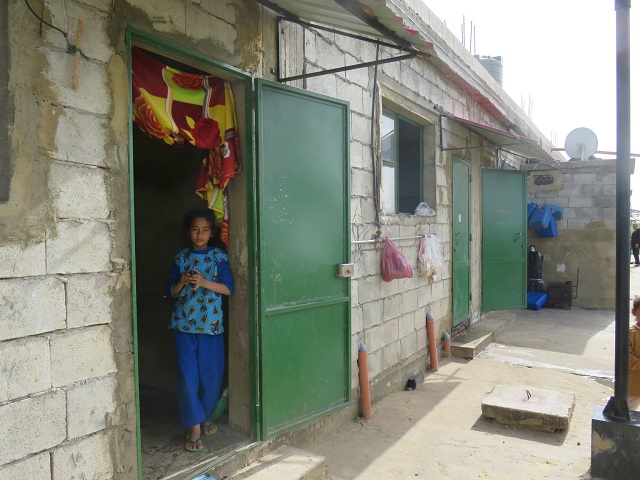 A line of former chicken coops that Syrian refugees use for homes. (Photo: Pam Bailey)
A line of former chicken coops that Syrian refugees use for homes. (Photo: Pam Bailey)
But the larger issue is the lack of rights Syrians receive in return. Any aid should be contingent on provision of their basic civil rights — and for the Palestinians as well, who have lived for almost three generations in often squalid conditions, without the right to work in many professions or own property, for instance.
Below is a letter written by a Syrian refugee who lives near Tripoli. She is afraid for her name to be used, so she has asked me to be her voice.
***
I write on behalf of about 2 million people from my country who live in extreme poverty here in Lebanon after fleeing the cruel war in Syria. I want to share some details of our daily life and ask that you try to put yourself in our shoes.
I have been living in Lebanon since July 2013. My husband, three sons and I have been waiting in limbo for about four years, torn in our hopes between the dream of returning to Syria and resettling somewhere else abroad.
I am not optimistic about being able to return home soon. I hear in the news that some Lebanese and American officials think they can create “safe zones” in Syria, but I do not trust such proposals. Just this month, my last relatives in Syria were forced to flee Homs, where my family used to live. How can we think of safe zones when people are still fleeing Syria, afraid for their lives? And what about the original owners of the land in these “safe zones”? We would live in someone else’s house, a home that’s not ours?
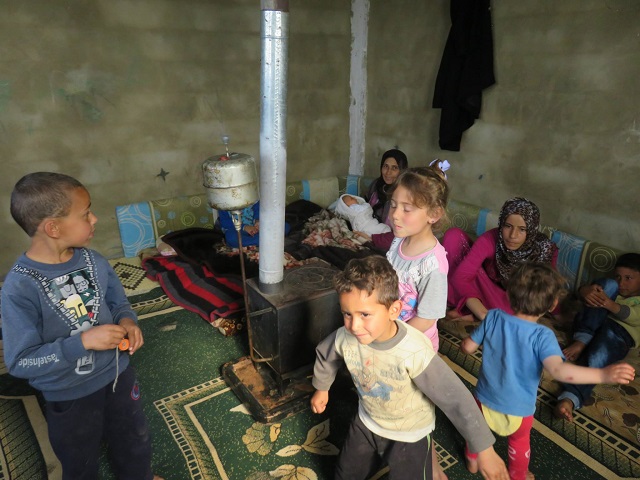 One of the rooms in the chicken coops for one family, including a newborn. (Photo: Pam Bailey)
One of the rooms in the chicken coops for one family, including a newborn. (Photo: Pam Bailey)
The only way I believe it will be safe for my family to return to Syria is after a new, fair election is held, with a new president and a life free of weapons. But that is clearly a long way off.
And so far, resettlement in another, welcoming country is an elusive dream. Although we have finally found an advocate in one of the confusing myriad of agencies here, he has warned me that it may be necessary for me to divorce my husband in order for my children to have a chance to find a new home! My husband is a former member of the Syrian military, and although he was only a driver and did not support the regime, that fact alone appears to be a barrier that has stood in the way of finding a country that will accept us and give my sons a better future. What a choice to have to make!
The one thing we are sure of is that we don’t want to stay in Lebanon, where we are not allowed to live like human beings. Instead, I feel like a mere shell, working hard for very little pay if I can get a job at all. I was an English teacher and my husband managed our own farm in Syria. Here, we can only get temporary contract work. We can barely afford the rent for the old restaurant we have turned into a home of sorts.
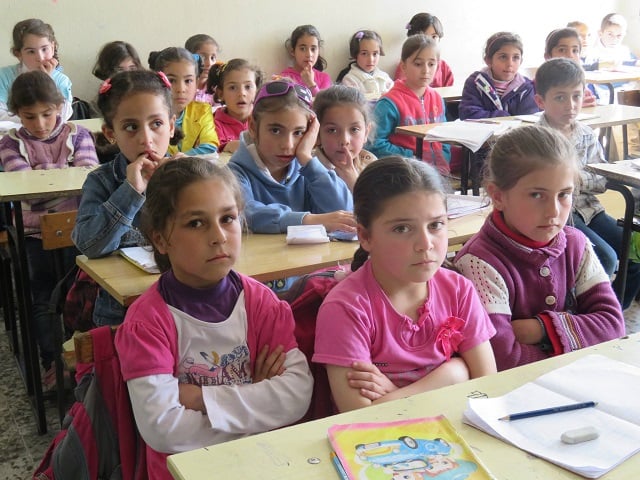 Syrian refugee students. (Photo: Pam Bailey)
Syrian refugee students. (Photo: Pam Bailey)
During the winter, we didn’t have any extra money to buy oil to warm my family, or to buy our daily bread and other needs. In such cases, we are obliged to borrow money from neighbors to meet our needs. We do not know when we will be able to pay them back. And yet, when someone from an NGO visited my home, they said, “Oh, you have beds!” — then decided as a result that we don’t need assistance, speaking in English among themselves. I tried to tell them that we found the beds thrown away by the side of the road when we first came here, and my husband repaired them so they would be usable. But it seems we are not considered “needy” enough unless we are sleeping on the floor or out in the open. That is what all of us refugees here notice: If our house is tidy and if a family has managed to acquire any semblance of a normal life, we are not considered deserving of financial aid. Well, I have a tidy house, and I have made curtains out of scraps. And I am bankrupt.
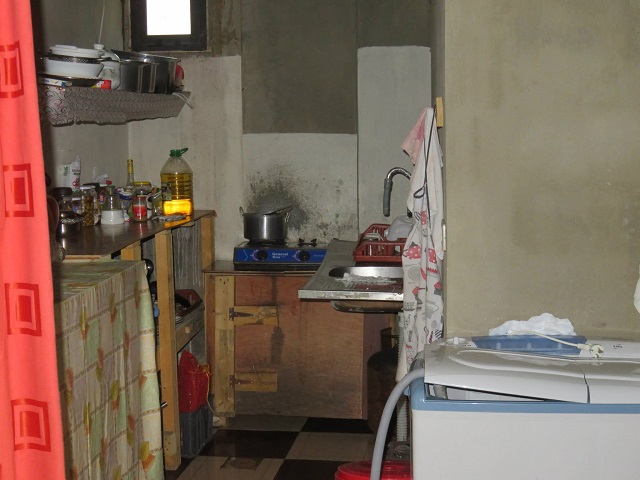 The kitchen of the Syrian refugee who authored this letter. Her family pays $250 a month for this. (Photo: Pam Bailey)
The kitchen of the Syrian refugee who authored this letter. Her family pays $250 a month for this. (Photo: Pam Bailey)
Moreover, there is the problem of health care. The UNHCR provides the only medical care available for Syrian refugees and only funds it for those older than 60 and kids under 6 years old, and when it’s truly an emergency. But what about everyone else? How can we work and sustain our families if we are sick? When my father-in-law was ill, I went to many organizations asking for help, telling them I had no money for medicine or even diapers since he couldn’t get out of bed to relieve himself. They promised to come and investigate his case. No one came. He died five months ago.
The future is uncertain for us. What is life when all we can think about is whether we can pay the rent, and how we can assure our children a good-quality education? (Actually, Syrian kids have become a way for the Lebanese to get more government funding for schools; yet, they do not receive the extra support they so urgently need. Even in formal schools, refugee kids suffer from verbal or even physical violence. Isn’t it enough that they are deprived of their home country and many members of their families?)
We have been here for five years. Yet to be a Syrian refugee means to live a haphazard, uncertain life. To be a Syrian refugee here means to be exposed to exploitation and deception, harsh work conditions, long work hours and low payment!
Above all, we feel like perpetual strangers. Sometimes I feel we will be like the Palestinians — homeless, unable to return to the nation of our birth and with no other country wanting us. We just want to live in dignity, with peace of mind.
I hope my letter finds an open heart.
Sincerely,
A Syrian citizen
Join us in defending the truth before it’s too late
The future of independent journalism is uncertain, and the consequences of losing it are too grave to ignore. To ensure Truthout remains safe, strong, and free, we need to raise $27,000 in the next 24 hours. Every dollar raised goes directly toward the costs of producing news you can trust.
Please give what you can — because by supporting us with a tax-deductible donation, you’re not just preserving a source of news, you’re helping to safeguard what’s left of our democracy.